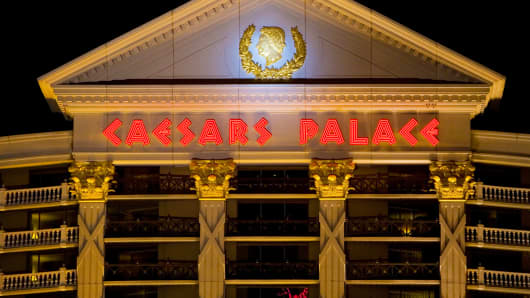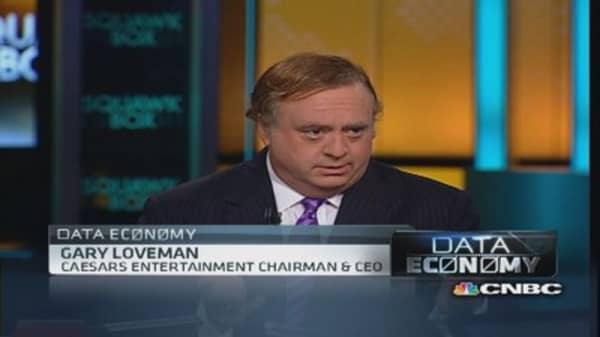Inside the Flamingo Hotel, in the heart of the Vegas strip, 200 people are hard at work gaming the system and making bets in ways very different from typical casino patrons.
The grandmothers with lucky charms pulling slots and the high rollers hiding their poker faces behind sunglasses are providing these 200 with vast amounts of information that Caesars Entertainment craves as it tries to understand the nature of the casino experience—what and why people buy, and how they like to experience their entertainment.
A better way to price the hotel, a wiser arrangement of tables, a sudden lapse in visits from longtime patrons—Caesars data analytics team is considering all these issues on a daily basis.
"We collect all the transactional data when customers are with us," said Gary Loveman, Caesars chairman and CEO, speaking on CNBC's "Squawk Box" on Thursday. That includes every restaurant, casino, spa and golf course purchase, as well as spending at other properties of the gaming and entertainment company.
"We're trying to predict the things that will interest them based on demographics and their revealed behavior," Loveman said.
(Read more: The three-and-a-half point Vegas cyborg)
In many cases, the data reveal surprising, counterintuitive trends. Wealthy people may have unsophisticated culinary taste, while less affluent patrons must try the latest fusion cuisine.
"There's a constellation of interests, and we want that [data analytics] to reflect what we learned about them last time," Loveman said. "We're running experiments to see what people are willing to do on the margin."
The real-world applications of the hidden operation stretch from Vegas to Atlantic City. One slot player likes a game that has frequent and small payouts, while another prefers the jackpot machine and has a world of patience.
"We have digital interfaces on the games now," Loveman said. It's like Netflix for gamblers. The game itself may direct the player to another machine, or a casino worker may be on hand to take advantage of the information from the digital interface and lead players to a machine where they are likely to find their interests matched.
(Read more: 3-D body scanners and virtual shoes: The new retail)
A core aim of the Caesars analytics team is to identify casino customers who have disappeared and re-engage them in the scene. Atlantic City, post Superstorm Sandy, was an example.
"Some customers never came back after Sandy," Loveman said, and the data led Caesars on a search for an answer to the exodus. Had Atlantic City visitors found a casino closer to home?
Caesars found that the chief reasons for the falloff was an incorrect idea about what was available.
"There was a perception that Sandy had left Atlantic City incapacitated, and we have to come back with an offer that is low risk and that they find terrific" so that they will return, Loveman said.





